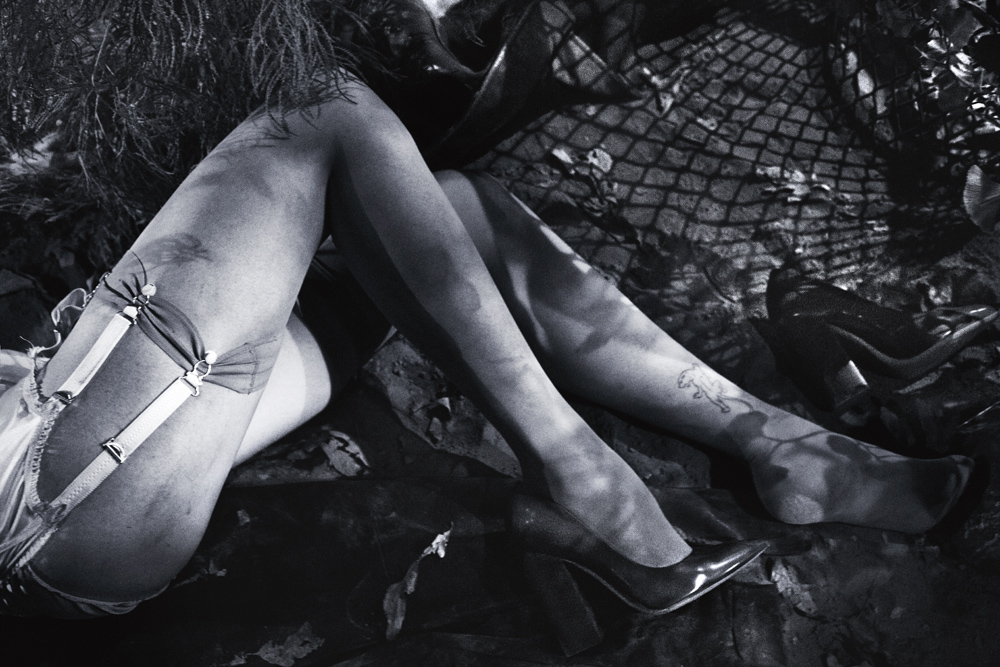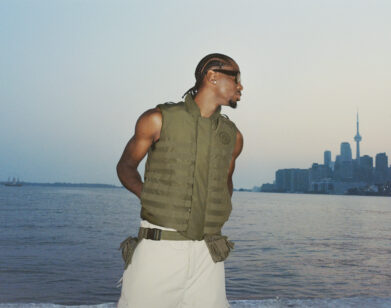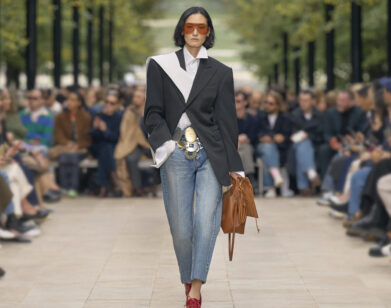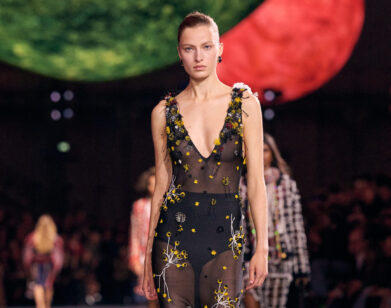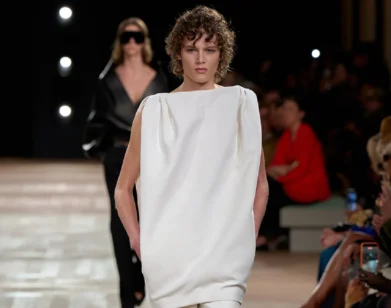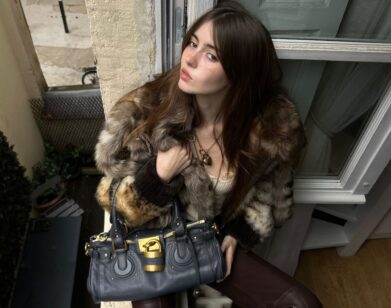Nicole KIDMAN by Steven Klein
I’m the luckiest person in the world . . . Photography saved my life. I’ve known since I was 13 or 14 what I wanted to do. STEVEN KLEIN
Growing up in Providence, Rhode Island, Steven Klein wanted to become a painter, and while studying at the Rhode Island School of Design, he became enamored with the work of English painter Francis Bacon. In retrospect, those kinetic portraits of turmoil for which Bacon is famous now seem to anticipate much of the provocative photography that Klein would go on to do. But, whether shooting a portfolio of Brad Pitt or Madonna (both of whom he has worked with regularly for years) or a fashion campaign for the likes of Alexander Wang or Dolce & Gabbana, Klein’s images inhabit their own signature physical and psychological terrain. It is as if his pictures, frequently featuring nymphs and icons in various stages of bondage, have had all hope and celebrity and color siphoned from them to reveal some elemental otherness, a dream world purely of Klein’s creation.
It was only a matter of time before the photographer, now 49, applied his vividly cinematic vision to the making of a movie, and that time seems to have finally come. Next year, Klein will direct his first feature-length film, a drama called Iced, under the watchful tutelage of director Lee Daniels, who is producing the film. In preparation for his big-screen debut, Klein cast Oscar winner Nicole Kidman as the latest damsel he directs into artful distress—a role well within range for the actress who plays a trauma victim suffering from amnesia in this month’s Before I Go to Sleep, opposite Colin Firth. Shortly after the shoot, the actress and soon-to-be director caught up by phone to talk about loves, limbo, and the power of purpose.
STEVEN KLEIN: Hi, Nicole. The thing is that we both hate talking on the phone.
NICOLE KIDMAN: [laughs] I always said that. I had so much fun on the shoot. It was very inspiring. You create a beautiful sort of limbo world, which is nice to exist in.
KLEIN: I was curious how you felt. If it’s like when you’ve built worlds—like working with Kubrick—constructing reality as opposed to being in reality.
KIDMAN: I like creating a bubble, and that was a bubble. I didn’t expect it, so that’s always good, too. But it does have a dreamlike quality. The whole thing felt like a dream. And at the end of the day, I went, “Did I do that?”
KLEIN: Oh, that’s good.
KIDMAN: [laughs] So, when was the first time you picked up a camera?
KLEIN: Probably when I was 14 years old and a friend of mine gave me a camera. At the time, I was really into making things out of clay. I was digging in the backyard to get my own clay and making pottery. And then I started taking pictures and built my own darkroom. I would go out at six in the morning and just take pictures. There was a mental institution near my house, and I would donate time teaching mentally ill patients how to do ceramics. I photographed them as well. So those were my first pictures.
KIDMAN: That’s amazing. And do you view the world through a lens?
KLEIN: Yes. I guess it’s a shield as well as my tool. But that’s the way I’ve always seen things and been able to express myself. I didn’t do so well in the academic world, so I think the only way I could express myself was through visual art—anything I could get my hands on, whether it was glassblowing, sculpture, painting, or photography. I always wanted to be a painter. Or a farmer.
KIDMAN: A farmer?
KLEIN: I don’t know why. That’s my earliest memory, wanting to be a farmer. Isolated. I have a farm now, but I’m not an actual farmer.
KIDMAN: Do you like the simplicity of that?
KLEIN: I do. Growing up, that’s how I saw myself, living very simply, an artist on a farm creating work. My work is the antithesis of that. And directing—when you have a hundred people around—is the opposite of that.
KIDMAN: Why do you love horses so much?
KLEIN: Oh, that’s a very personal story, but I had a huge crush on a girl when I was 13 years old. This older guy—I think he was probably four or five years older than me—wanted to meet her and he had a horse. I lived in the suburban area, and he lived in a farm area. One day he came over to my house with his horse, and I said, “Well, let’s go to my girlfriend’s house and show her the horse.” And so we went over to her house and then he took her for a ride, took her to the lake, and then they never came back.
KIDMAN: [laughs] The seduction of the girl—very powerful.
KLEIN: I went home crying. But I was just attracted to horses. I remember driving by a horse show and seeing this beautiful white horse going over jumps, and it looked like he was flying. He looked like Pegasus. I love horses and love being with them. I like the precision of training and riding.
KIDMAN: I like riding very powerful horses. And being a little afraid.
KLEIN: The fear factor—that’s why I like jumping. I’m always a bit nervous even though I’ve been doing it for 20 years. I’ve fallen a bunch, but this recent fall, in June, was the first time I broke my arm.
KIDMAN: I’ve jumped for films, but I don’t now. I mean, I used to jump out of planes and all sorts of stuff, but I’ve now tamped it down a little bit. Maybe when I’m in my seventies, I’ll start back up with all that stuff, but I feel the desire to stay alive now.
KLEIN: Well, when you have children …
KIDMAN: I just feel like I’m in the world right now. There have been times when I haven’t felt in the world, when I haven’t cared whether I was going to be here or not, so my relationship with being on the earth was probably not as intense. And right now, there’s an intensity—I want to be here.
KLEIN: It’s sometimes hard to be in this reality. Sometimes you feel like a foreigner.
KIDMAN: I suppose that’s why I loved going into your set, because I love the limbo. I do believe that there are many different realms we can exist in, and a lot of this is just a dream state anyway.
KLEIN: It’s supposed to be an illusion.
KIDMAN: Now you’re going to do your film. That’s a huge step for you.
KLEIN: I know, a scary one. [laughs] The funny thing is that I almost find it more difficult now to take a still picture than to be behind a moving camera. I’m just so much more inspired and comfortable and confident when I have that whole operation going. I feel more connected. Snapping a moment doesn’t seem relevant to me anymore.
KIDMAN: I remember Jane Campion saying to me that she had the best film professor and that he would make her and her classmates tell stories with no words. You do that very naturally. I love acting with very little dialogue. As long as it’s supported. I mean, in terms of cinema, you can have a great monologue, but if you’re not supported by the images … You can be feeling things and then you see it back, and you’re like, “None of that came across.” Or the angle of my face gives it a completely different interpretation than what I was trying to communicate.
KLEIN: It’s so important—the fractions of inches. But I love that you’re a risk-taker.
KIDMAN: From Stanley [Kubrick], I learned never to say no to an idea, to try things because you never know where it’s going to lead, and I love the mystery. I love intimacy. I love being really, really close. That’s probably why I don’t do well in big parties, because I’d much prefer the deeper conversations, the one-on-one. I like deep intimacy.
KLEIN: That’s how you get to really know somebody, but I think a lot of people like to know people superficially and don’t go and investigate or challenge them. Even as friends, people don’t challenge each other.
KIDMAN: I’ve just always been interested in how people lead their lives. How they survive in this world. I’m curious about people’s damage, and navigating that and the way people forgive. I find it really interesting. That’s why we have to transform on a daily basis, work on ourselves. It’s work. I find the nighttime—3 a.m.—is when I have a huge sort of epiphany or gasp, like, [gasps] “What is this? What have I done? I’ve wasted my whole life. What is my life?” [laughs] Just at 3 a.m. “Why did I spend my 20 years doing this? What am I really doing with my life? What does it really mean? Who am I?” Ugh. That’s when it really becomes apparent that this is probably all just a dream state.
KLEIN: I get those. But you have to just be, to stay awake in it.
KIDMAN: That’s when I need to go swim in the ocean.
KLEIN: Does that help?
KIDMAN: It does for me. But I’m Australian, and I grew up with waves. I bodysurf. I’m excited for you to do a movie.
KLEIN: I feel really blessed that Lee [Daniels] is mentoring me. He’s been so kind and helpful. What would you say are the most important things you get from a director?
KIDMAN: Understanding, space to create, and being incredibly detailed—being able to go, “I like that, I want that. I don’t want that, I want that.” Do you love having a passion in life, having something that you feel drawn to and still want to do?
KLEIN: Oh, I feel like I’m the luckiest person in the world. It saved my life, because I was definitely going down the wrong road, and art, photography saved my life. I’ve known since I was 13 or 14 what I wanted to do. I was on this path, although I’ve had really difficult times, and maybe things didn’t happen as fast as I wanted them to. But I feel like that’s the lucky thing that I have is always knowing what I wanted to do.
NICOLE KIDMAN IS AN ACADEMY AWARD-WINNING ACTRESS. HER UPCOMING FILMS INCLUDE BEFORE I GO TO SLEEP, OUT THIS MONTH, AND WERNER HERZOG’S QUEEN OF THE DESERT.
For more from the Photographers’ Portfolio, click here.

